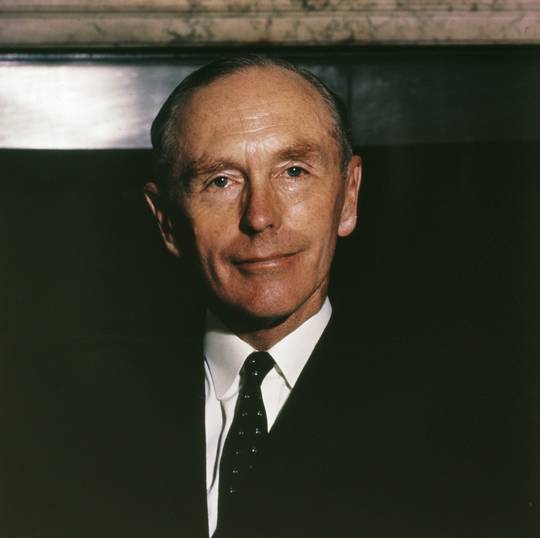Sir Alec Douglas-Home (1903-95), really the 14th Earl of Home, was a welcome change from his two predecessors, being honest, well-balanced and not from the far left of the party. Alas, he lasted only a year. At his birth, his grandfather the 12th Earl owned over 100,000 acres, centred in the Scottish border region, and he was educated at Eton and Christ Church, where he got a Third-class degree but played first-class cricket.
Home won Lanark in the 1931 Conservative landslide, and then in 1936 became parliamentary private secretary to Neville Chamberlain, then Chancellor of the Exchequer, a job which he kept through Munich until Chamberlain’s resignation in 1940. With his association with Chamberlain and Munich, Home was out of office until the last days of the war, then became a fierce critic of the Yalta agreement before losing his seat in 1945.
By 1951 Home was in the Lords and was promoted to the Cabinet only when Eden replaced Churchill in 1955. He then became Foreign Secretary in 1960, in which job he was highly successful, helping negotiate the 1963 Test Ban Treaty. In October 1963 he benefited from Macmillan’s anti-Butler machinations and was a surprise choice as prime minister, for which he was forced to take the then novel step of resigning his Earldom.
As prime minister Home’s major achievement was the abolition of retail price maintenance, a major pro-consumer, pro-market economic measure albeit unpopular with small traders, but a year after his appointment he almost won an election he had been universally expected to lose. With the younger less aristocratic Harold Wilson now prime minister, he was forced out of the leadership the following summer in favour of the younger less aristocratic Edward Heath, a decision the Conservative party has regretted ever since. He then had another modestly successful period as Foreign Secretary in 1970-74.
If Home had won the 1964 election, he might well have reversed Britain’s relative economic decline fifteen years early and have deserved a high place on this list. As it is, he should rank somewhere in the 30s, higher than other short-termers.
